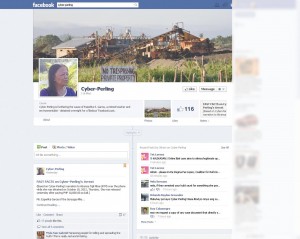Arrest sparks row over cybercrime law

IN SUPPORT OF PERLING Netizens created this Facebook page to support Esperlita Garcia, who has been sued and arrested for libel for taking her opposition to mining to cyberspace. SCREENSHOT FROM FACEBOOK
BAYOMBONG, Nueva Vizcaya—Environmentalists and Internet users have rallied behind Esperlita “Perling” Garcia, an antimining advocate who was arrested on Thursday on libel charges for a purported critical post on Facebook in spite of the Supreme Court’s suspension of the cybercrime law.
In Manila, however, presidential spokesperson Edwin Lacierda said the arrest of the 62-year-old Garcia, who was detained overnight and released on Friday after posting a P10,000 bail, was prompted by a violation of the Revised Penal Code.
Lacierda denied the claim of the militant youth group Anakbayan that Garcia was arrested for violation of the harsher electronic, or e-, libel law.
“This is not a case of e-libel,” Lacierda told reporters, dismissing suggestions that the Garcia case smacked of an “e-martial law” clampdown on social networking sites.
It was the second known case of an alleged cybercrime since 16 nurses were sacked in August for having “liked” criticism on Facebook against the Taguig-Pateros District Hospital.
Since Saturday, netizens have been visiting “Cyber-Perling,” the Facebook page set up to mobilize support for Garcia, president of the Gonzaga Alliance for Environmental Protection and Preservation.
The alliance is leading the opposition to small-scale mining operations for magnetite sand by Chinese and Taiwanese companies in Gonzaga, Cagayan province. The activity has been authorized by the Cagayan provincial government.
“Let’s continue to protect our environment with prayers, and let’s support people like Ma’am Perling. Saving people like [her] is saving our lives,” said Martin Francisco, president of the Sagip Sierra Madre Environmental Society Inc., a nongovernment organization.
Barely two days after her arrest and overnight detention, “Cyber-Perling” has become the face of the netizens’ fight against Republic Act No. 10175, or the Cybercrime Prevention Act of 2012.
Early this month, however, the Supreme Court issued a 120-day temporary restraining order on the law’s implementation while it decided at least 15 petitions to declare the law unconstitutional.
Cyber-Perling
In comments on the “Cyber-Perling” page, Facebook users have expressed alarm that even before its effectivity, the cybercrime law is already being used to stifle the citizens’ right to expose alleged abusive acts of public officials.
Garcia was charged with libel by Gonzaga Mayor Carlito Pentecostes Jr. for the note she posted on Facebook in April 2011, or 18 months before the enactment of RA 10175, which punishes online libel with up to 12 years imprisonment.
The post assailed Pentecostes’ role in the harsh dispersal of people who were meeting inside a school compound for a planned antimining rally on April 30.
Pentecostes denied Garcia’s allegations. He also stood pat on his decision to pursue libel charges against Garcia to “teach her a lesson for her arrogance.”
“[Garcia] portrayed me as a very bad person on Facebook. She has been making up stories about the supposed opposition of the people of Gonzaga against mining when in truth, there is no such resistance here now,” he said.
Freedom of expression
Support from friends and allies, Garcia said, strengthened her resolve to fight for the people’s right to free speech.
She described the libel charges, including the manner of her arrest by agents of the National Bureau of Investigation (NBI), as harassment.
“I find it interesting that no less than the regional director of the NBI (Hector Eduard Geologo), who had to travel for more than five hours, personally carried out my arrest,” Garcia said by telephone Monday.
Green Convergence, a network of 10 environment NGOs, assailed the arrest of Garcia, noting the Supreme Court’s action on RA 10175.
“[Garcia’s] arrest is clearly illegal and should not be tolerated by the Department of Justice [or] by any freedom-loving Filipino,” it said in a statement.
In a press conference in Malacañang Monday, Lacierda twitted Anakbayan, a rival of the administration-allied Akbayan of Presidential Adviser on Political Affairs Ronald Llamas.
“The claim of Anakbayan is that this is based on the Cybercrime Protection Act. We verified it with the NBI who effected the arrest. The basis for the arrest was not the Cybercrime Protection Act, which we all know has been restrained by the Supreme Court,” Lacierda said.
Not e-libel
He said that the arrest order against Garcia was based on a libel suit under Article 355 of the Revised Penal Code.
“If you notice, the bail posted was P10,000. The penalty for online libel is prision mayor, which is higher than the penalty imposed under the Revised Penal Code. So this is not a case of e-libel,” Lacierda said.
“Let me be clear, let me also inform our good friends from Anakbayan and I hope they don’t ride on this issue but apparently they already rode on it, but they’re claiming that this is the start of e-martial law. Let me tell Anakbayan, please don’t be ignorant of the issues. First, you’re entitled to your opinion but you are not entitled to your facts,” Lacierda said.
De Lima assurance
Also on Monday, Justice Secretary Leila de Lima vowed her office would uphold constitutionally guaranteed rights and freedoms in the event the Supreme Court upheld the anticybercrime law.
Speaking at the 2nd Philippine Anti-Counterfeiting and Piracy Summit at Edsa Shangrila Hotel, De Lima said while the gathering was about intellectual property rights protection she cannot help but touch on “one of the hottest topics of today,” the Cybercrime Prevention Act.
“The provisions of the (law) are now submitted for scrutiny of their constitutionality before the Supreme Court but, regardless of how that case will be eventually resolved, it is a concrete sign that we, in government, take intellectual property rights protection very seriously, whether infringement is committed in the physical world or in cyberspace,” she said. With a report from Christine O. Avendaño
Originally posted: 9:17 pm | Monday, October 22nd, 2012